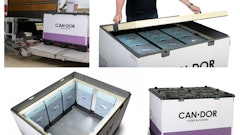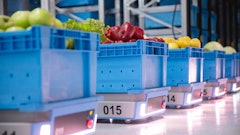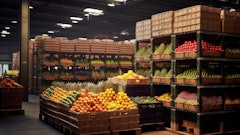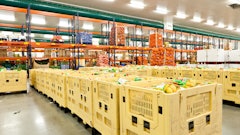
In recent years, the promise of omnichannel for grocers loomed on the horizon, a concept that felt like a future problem, not necessarily a problem that demanded immediate attention. The pandemic changed all of that and forced the need for a functioning omnichannel front and center, placing that need squarely on the shoulders of logistics managers. Major grocers answered.
In fact, online grocery orders rose 50% during the pandemic according to a study by McKinsey. The pandemic changed the trajectory of consumer expectations and now consumers expect -- and have come to rely upon -- an efficient omnichannel experience. Couple that with the strong and growing Millennial preference for curbside pickup of online orders, and it is clear the need for efficient omnichannel experience is not going anywhere.
Now in 2024, we are seeing increased demand and a complete reliance upon omnichannel that will require grocers to continue to evolve fulfillment strategies at an accelerated pace. Reliance on old technologies, processes and systems isn’t going to cut it, particularly in the face of consumer demand for convenience, food quality, availability and cold chain compliance that only continues to grow.
To get ahead, grocers need to position themselves to be successful by opting for sustainable modular solutions that exceed regulatory demands. Solutions that can maximize space utilization, scale with the natural ebbs and flows of order volume, and enable tri-temperature order consolidation to improve speed to curb and order accuracy.
Enter sustainable modular solutions, the key to efficiency, gaining new revenue streams and complete cold chain compliance.
By choosing modular solutions that exceed regulatory standards, grocers will lead in sustainability while avoiding the need to retrofit solutions when new regulations are enacted. Moreover, expertly chosen modular solutions will grow with you, allowing a business to flex when demand surges, whether that demand is through curbside or delivery. Said differently, it represents a clear opportunity to future proof your omnichannel’s growth potential.
Razor-thin margins are a given in the grocery industry. Dependent on consumer demand, employing a strategy that allows for both cost cutting and increasing margins, provides the best opportunity for profitability and growth. These over-arching business goals can be achieved by making omnichannel-focused improvements that can scale based on consumer preferences and wants.
Using sustainable modular solutions allows grocers to cool only the portion of an order, or only the orders, that need it, reducing energy costs, while also saving time on curbside delivery and allowing for a reduction in the space needed for staging. Temperature-controlled electronic totes can be used to replace retrofitted coolers in backrooms while reducing the overall cooling footprint by as much as 50% or more. The modular nature of temperature-controlled electronic totes allow even smaller grocers to capitalize on the cost-savings by investing in and implementing only what they need as they grow, rather than requiring large CAPEX on a complete revamping of their omnichannel operations.
A recent study by Market Research Future found that the omnichannel retail commerce platform market is expected to grow from $5.36 billion in 2023 to $21.86 billion by 2032, at a compounded annual growth rate of 19.2%. What was once an ugly word for grocers resistant to change, omnichannel now represents untapped opportunity for growth. For grocers, the promise of the omnichannel is here to stay.


























